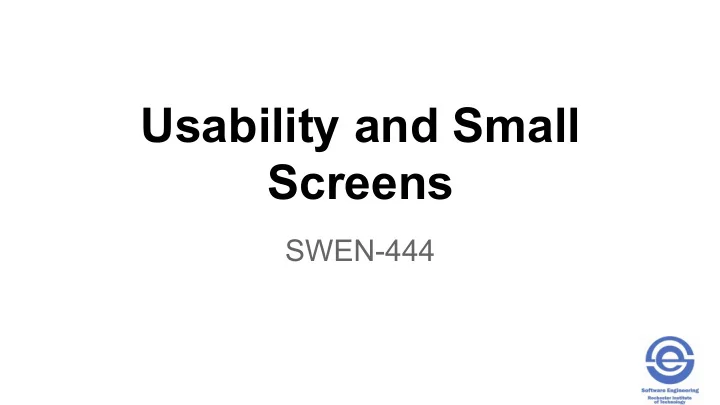

Usability and Small Screens SWEN-444
iPhone Android Windows Phone 8
“The phrase ‘mobile usability’ is pretty much an oxymoron. It's neither easy nor pleasant to use the Web on mobile devices.” “designing for mobile is hard” “It’s not enough that a site will display, can the user get things done?” Jacob Nielsen, useit web site
Small Screens • We will focus on consumer mobile devices such as smartphones and tablets • However, there is another large category of embedded devices to be considered as well • Design guidelines apply equally to those devices with more constraints such as safety GPS Digital Camera Airplane Control
Designing for Mobile Devices • Form factors • OS’s support full screen apps instead of windows • Especially for handhelds • Tablets borrow more interface patterns from the desktop About Face , Cooper, Reimann, Chapter 19
Mobile Usability Problems (Opportunities) • Small screens (inherent) • Awkward input (“fat finger syndrome”) • Network performance and reliability, especially for downloads (but getting better) • Mis-designed web sites – designed for the desktop just makes it worse (but getting better)
Class Activity • Choose a mobile phone app • Critique the user experience in terms of the mobile device design guidelines described in this lecture • What general design principles are represented? • Score the your UX on a scale of 1 to 10 and explain your scoring.
Guidelines for Mobile Design • Design goal - mitigate the constraints but exploit device features • To preserve screen real estate … • Use transparency; e.g., widgets • Vertical or horizontal screen navigation • Use images sparingly • Minimize use of footers, breadcrumbs, progress indicators, menu bars • Screen layout: • Important information at top • Most frequently used controls at bottom
Guidelines for Mobile Design (cont.) • Limit navigational hierarchy, especially global to contextual transition, to avoid losing the user • Apply Fitt’s Law: large objects for navigation (touch) versus hypertext • Tradeoff? • Apply screen layout design patterns; E.g…. • Carousels • Stacks • Lists • Grids • Cards • Tab bars • Drawers
Guidelines for Mobile Design (cont.) • Rapid serial presentation of text, important information first (progressive disclosure); • however… • Short text lines slows down reading speed -disrupt the normal pattern of eye movements • Minimize extended scrolling or paging • Optimize reading - lower screen resolution degrades information retrieval and interpretation • 14pt fonts • Organize text with headings
Guidelines for Mobile Design (cont.) • Consider the physical feel – ergonomics, UX • The use of the (one) hand – fingers, particularly for thumb convenience • E.g., screen layout to accommodate thumb span • Finger tip area guides standard tap target size (e.g., iPhone 44 pixels)
Searching and Sorting • Mobile apps are better at browsing, complex data entry is not easy or practical so … • Minimize search effort • Voice • Auto-complete, auto suggest • Recent/frequent searches • Sort – provide a visible control to allow the user to specify and refine sorting criteria
In Class Activity • Design a digital user interface replacement for this analog car radio (1973) • Add one new innovative feature now possible with digital • The screen size is 5x7” • Constraint – minimize the impact on distracted driving • Annotate with the primary design principles and guidelines you employed; why is it better than the analog version? Tone AM/FM Select On/off, volume Tuning Channel memory –to save pull, to select by band push
References • Lari Kärkkäinen and Jari Laarni, ”Designing for Small Display Screens”, NordiCHI, October 19-23, 2002 • uxmatters.com: Usability for Mobile Devices • Josh Clark, Tapworthy – Designing Great iPhone Apps , O’Reilly Media, 2010 • Alan Cooper, Robert Reimann, et al, “About Face”, Wiley, 2014
Recommend
More recommend